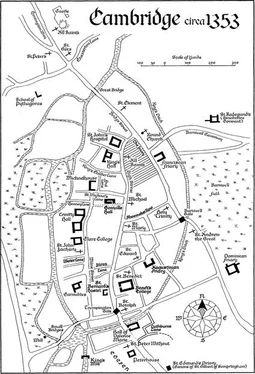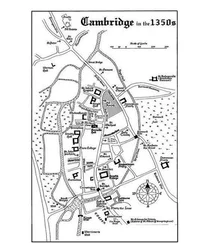‘Apparently not for this one,’ said Michael stiffly. ‘I bought a cake from a baker in the Market Square, and the thing decided to share it with me. No amount of flapping and running seemed to deter it, and so I was reduced to swatting it when it landed. Then it had the audacity to sting me.’
‘If the bee was crushed, you had the better end of the bargain. But we have been away from our students long enough. I want mine to learn about how Galen developed the Hippocratic theory of the four humours, not about how the Devil founded the Dominican Order, which is what Father William seems to be bawling to his students – and to the world in general – this morning.’
‘Is he really?’ asked Michael, half startled and half amused. ‘I have been in such agonies with this sting that I have not even heard our Franciscan fanatic today – and that should tell you something of the suffering I have endured.’
Bartholomew frowned. ‘William should be more discreet about his dislike of Dominicans. Master Kenyngham told me last night that one of our two new Fellows – due to arrive today – is a Dominican.’
‘I expect Kenyngham told William, too – hence this morning’s bit of bigotry. You know the Franciscans and the Dominicans in Cambridge loathe each other, Matt. They are always quarrelling about something they consider desperately important – usually something the rest of us neither understand nor care about.’
‘I hope William and this new Dominican will not turn Michaelhouse into a battleground,’ said Bartholomew with feeling. ‘We have managed to remain pleasantly free of squabbles between religious Orders so far, and I would like it to remain that way.’
‘It might spice things up a little,’ said Michael, green eyes gleaming as he contemplated the intrigues of such a situation.
‘It would not,’ said Bartholomew firmly, replacing the jar of salve in his bag and washing his hands. ‘William does not have the intellect to embark on the kind of clever plotting you enjoy – he is more of a fists man.’
Michael laughed. ‘You are right. But you have missed your chance to enthral your students with lurid descriptions of bile, phlegm and blood this morning, Matt, because the porter will ring the bell for the midday meal soon. Hurry up, or there will be nothing left.’
He had shot from the storeroom and was crossing the courtyard to be first at the table, before Bartholomew could reply. The physician smiled at the fat monk’s greed, finished tidying his chamber, and followed at a more sedate pace. He shivered as he walked across the yard to the hall. A bitter north wind blew, bringing with it the promise of yet more rain, and perhaps even snow. He had just reached the porch when Cynric, his book-bearer, came hurrying towards him, shouting to catch his attention.
‘You had better come with me, boy,’ said Cynric breathlessly. ‘I have just found Justus dead near Dame Nichol’s Hythe, on the river.’
‘You mean the Justus who is John Runham’s book-bearer?’ asked Bartholomew, startled. Justus had served dinner at high table only the previous evening. ‘How did he die? Did he drown?’
Cynric looked uncomfortable. ‘It is not for me to say – you are the physician. But come quickly before the poor man’s corpse attracts a crowd of gawking onlookers.’
Bartholomew followed him out of the College and down the lane to the ramshackle line of jetties that lined the river bank. They turned right along the towpath, and headed for the last pier in the row, known as Dame Nichol’s Hythe. Dame Nichol was long since dead, and the sturdy wharf she had financed was now in a sorry state. Its timber pillars were rotting and unsafe, and huge gaps in its planking threatened to deposit anyone standing on it into the sluggish brown waters of the River Cam below. The bank behind was little more than a midden, cluttered with discarded crates, broken barrels and scraps of unwanted clothing, and the fetid mud was impregnated with human and animal waste. The whole area stank of decaying, wet wood and sewage.
In the summer, the wharves – even Dame Nichol’s – were hives of activity, with barges from France and the Low Countries arriving daily, loaded with all manner of exotic goods, as well as the more mundane wool, grain and stone for building. In the winter, however, the colourful bustle of the tiny docks all but ceased, and that day only a few shabbily dressed bargemen laboured in the chill wind, slowly and listlessly removing peat faggots from a leaking flat-bottomed skiff. Two gulls watched Bartholomew and Cynric with sharp yellow eyes, waiting for them to be gone so that they could resume their scavenging for the discarded fish entrails and eel heads that lay festering and rank in the sticky muck of the towpath.
Cynric’s fears that Justus’s body would attract hordes of intrigued townsfolk were unfounded: the toiling bargemen – and even the birds – were not interested in it. Life was hard for many people following the Great Pestilence that had swept across the country, and it was not uncommon for desperate souls to end it all in the murky depths of the river. Justus lay disregarded and uncared for amid the scrubby weeds and filth, no more popular or remarkable in death than he had been in life.
Justus had been the servant of a Michaelhouse Fellow called John Runham, although Bartholomew had always been under the impression that they did not like each other. He could understand why: Runham was smug, condescending and arrogant; Justus was self-absorbed and dismal.
‘I found him when I came to buy peat for the College fires,’ explained Cynric. ‘I noticed a stray dog sniffing around, and when I came to see what it had discovered, I saw Justus. At least, I assume it is Justus. He is wearing that horrible tunic Justus always donned when he was not working.’
Cynric had a point about the corpse’s identity. The bizarrely patterned garment of which Justus had been so fond was all that could be immediately identified, because a thick leather wineskin had been pulled over the body’s head and then tied tight under the chin with twine. Bartholomew crouched down and undid it, noting it had been knotted at the front in the imperfect, haphazard way he would expect from a suicide. He drew it off, hearing Cynric’s soft intake of breath as he saw the dark, swollen features of the dead book-bearer.
‘Well, it is Justus right enough,’ said Cynric grimly. ‘I would recognise those big yellow teeth anywhere. Did he kill himself?’
‘It looks that way,’ said Bartholomew, inspecting the wineskin. It was a coarse, watertight sack, designed to hold cheap brews for those not able to afford the better wines that came in casks. Because the bag had been sealed with resin to make it leak-proof, it was also air-proof, and once the rope had been tightened around the neck, it had suffocated the wearer.
‘Justus was never a contented man,’ said Cynric, regarding his fellow book-bearer pityingly. ‘He was always complaining about something. And he envied me my happiness with Rachel.’ He gave a sudden and inappropriate grin. ‘Married life is a fine thing, boy. You should try it.’
‘Perhaps I will one day,’ said Bartholomew vaguely, unwilling to indulge in such a discussion when one of the College servants lay dead at his feet. ‘But first, I want to be certain that Justus killed himself, and that no one gave him a helping hand into the next world.’
‘But why would anyone do that?’ asked Cynric, surprised. ‘He had nothing worth stealing, because he spent all he earned on wine or ale. None of his clothes are missing as far as I can see, and here is his dagger – not a very valuable item, but one that would have been stolen had he been murdered for his possessions.’
Bartholomew inspected the dead man in more detail, checking for signs that Justus might have been involved in a struggle. He examined the man’s hands, but they were unmarked and the fingernails showed no evidence that he had clawed at an assailant. Ignoring an exclamation of disgust from Cynric, Bartholomew sniffed cautiously at Justus’s mouth, and detected the pungently sweet odour of alcohol – far stronger than he would have expected had the smell come simply from Justus having a wineskin over his head for a few hours.
Читать дальше












